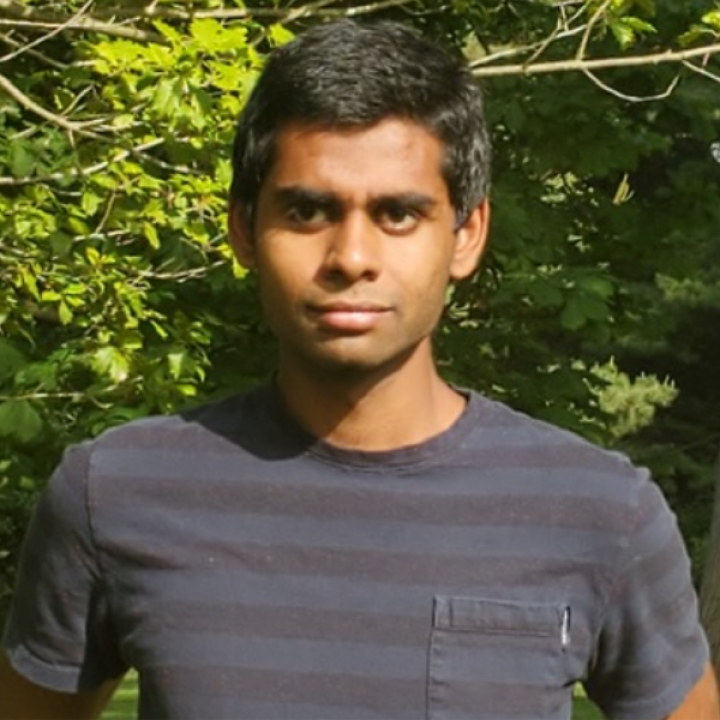Senior Naveen Raman Named Philip Merrill Presidential Scholar
Senior computer science and mathematics double major Naveen Raman was named a University of Maryland Philip Merrill Presidential Scholar.
The Merrill Presidential Scholars Program honors the university’s most successful seniors, who each recognize a UMD faculty member and high school teacher who helped guide, inspire, coach, tutor and challenge them in both big and small ways.
“Programs like these are critical to our students’ success,” said UMD President Darryll J. Pines. “They celebrate invaluable mentorship that will have a long lasting impact on the lives of our students, while on campus and beyond. We are incredibly grateful for the individuals who have been instrumental to our students’ progress during their academic journeys.”
Raman honored Heather Hennis from Richard Montgomery High School in Rockville, Maryland, and John Dickerson, an assistant professor in UMD’s Department of Computer Science.
“In high school, the mentorship I received from Dr. Heather Hennis was immensely helpful for both my personal and academic development,” Raman said. “She helped me learn about a variety of topics ranging from networking to databases to artificial intelligence, which prepared me for my college computer science courses. Outside of the classroom, Dr. Hennis served as the advisor for the computer club, helping us prepare for programming competitions. Her guidance allowed me to improve both my technical and personal skills.”
Raman, who is also a member of the Advanced Cybersecurity Experience for Students in the Honors College and the Global Fellows program, and a President’s Scholarship recipient, began working with UMD computer science faculty members in 2018. Since then, he has authored or co-authored seven conference papers.
He began by developing algorithms to identify cancer mutation signatures with Distinguished University Professor Aravind Srinivasan and former Assistant Professor Max Leiserson and moved on to working with Dickerson to develop policies that balance fairness and profit in ride-pooling systems.
“...I sought out research opportunities and connected with Professor John Dickerson’s research into artificial intelligence for social good,” Raman said. “In his lab, he proposed a project and guided me through the research process, teaching me how to read prior work, develop experiments and write papers. Professor Dickerson has also advised me on career plans, helping me understand the contrasts between industry and academia.”
He also works with Associate Professor Jordan Boyd-Graber to improve question answering systems by leveraging data from trivia competitions. Raman’s focus is on advancing so-called named entity linking algorithms, which connect names found in a question to larger repositories of data about them like Wikipedia. These advances will ultimately help question answering systems perform better on a diverse set of questions.
“Naveen Raman is a clear star researcher—and practitioner—in the making,” Dickerson said earlier this year when Raman was named a 2021 Goldwater Scholar. “He is driven, questioning, curious and technically talented, as well as a young adult with a strong sense of civic duty and commitment to using technology for social good.”
In summer 2019, Raman worked to detect rudeness, toxicity and burnout in open-source communities as a participant in Carnegie Mellon University’s Research Experience for Undergraduates in Software Engineering program. Two summers ago, he worked at Facebook to develop a user interface for debugging machine learning models and learned about important societal issues that machine learning can help solve, such as hate speech detection. Last summer, he worked at MIT Lincoln Labs to improve human-artificial intelligence collaboration.
An active competitor, Raman’s team won the National Academy Quiz Tournaments’ Division 2 Intercollegiate Championship Tournament during his freshman year. In 2020, he and two classmates received an honorable mention award in the 72-hour Mathematical Contest in Modeling for their project that analyzed the effect that rising global temperatures have on herring and mackerel fishing along the Scottish coast. He also received an outstanding award in the 2020 SIMIODE Challenge Using Differential Equations Modeling for his team’s work on modeling interactions in refugee camps.
He has been a teaching assistant for a programming languages class and the lead student instructor for a class on algorithms for coding interviews.
Off campus, Raman teaches math skills to underprivileged elementary school students in the Maryland Mentor Program and previously volunteered at the College Park Academy charter school helping students improve their math skills.
He has been awarded the Brendan Iribe Endowed Scholarship, Capital One Bank Dean’s Scholarship in Computer Science and Corporate Partners in Computing Scholarship.
Raman plans to attend graduate school to pursue a Ph.D. in computer science, with a focus on the fairness of artificial intelligence algorithms in critical fields such as criminal justice, job markets and health care.
The Philip Merrill Presidential Scholars Program was created in 2004 by the late Philip Merrill, friend of the University and long-time Washington area publisher, to build a community of scholars, faculty members and K-12 teachers who recognize the importance of teaching and mentoring the next generation. The Scholars are selected by the academic colleges and schools with undergraduate major programs. The program provides $1,000 scholarships, which are awarded in the K-12 teacher’s name to another student from that school district who will attend UMD in the fall of 2022.
“The Merrill Presidential Scholars Program is creating an important legacy,” said William A. Cohen, Associate Provost and Dean for Undergraduate Studies. “In recognizing that mentorship is at the heart of academic and personal achievement, these scholarships honor the K-12 teachers and UMD undergraduate faculty who support student success through academic guidance, encouragement, and support.”
Written by Abby Robinson
The Department welcomes comments, suggestions and corrections. Send email to editor [-at-] cs [dot] umd [dot] edu.
